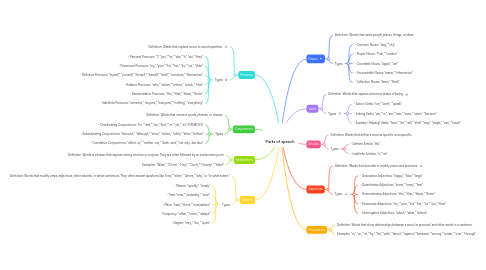
1. Pronouns
1.1. Definition: Words that replace nouns to avoid repetition.
1.2. Types
1.2.1. - Personal Pronouns: "I," "you," "he," "she," "it," "we," "they"
1.2.2. - Possessive Pronouns: "my," "your," "his," "her," "its," "our," "their"
1.2.3. - Reflexive Pronouns: "myself," "yourself," "himself," "herself," "itself," "ourselves," "themselves"
1.2.4. - Relative Pronouns: "who," "whom," "whose," "which," "that"
1.2.5. - Demonstrative Pronouns: "this," "that," "these," "those"
1.2.6. - Indefinite Pronouns: "someone," "anyone," "everyone," "nothing," "everything"
2. Conjunctions
2.1. Definition: Words that connect words, phrases, or clauses.
2.2. Types
2.2.1. - Coordinating Conjunctions: "for," "and," "nor," "but," "or," "yet," "so" (FANBOYS)
2.2.2. - Subordinating Conjunctions: "because," "although," "since," "unless," "while," "after," "before"
2.2.3. - Correlative Conjunctions: "either...or," "neither...nor," "both...and," "not only...but also"
3. Interjections
3.1. Definition: Words or phrases that express strong emotion or surprise. They are often followed by an exclamation point.
3.2. Examples: "Wow!," "Oh no!," "Hey!," "Ouch!," "Hooray!," "Yikes!"
4. Adverbs
4.1. Definition: Words that modify verbs, adjectives, other adverbs, or whole sentences. They often answer questions like "how," "when," "where," "why," or "to what extent."
4.2. Types
4.2.1. - Manner: "quickly," "slowly"
4.2.2. - Time: "now," "yesterday," "soon"
4.2.3. - Place: "here," "there," "everywhere"
4.2.4. - Frequency: "often," "never," "always"
4.2.5. - Degree: "very," "too," "quite"
5. Nouns
5.1. Definition: Words that name people, places, things, or ideas.
5.2. Types
5.2.1. - Common Nouns: "dog," "city"
5.2.2. - Proper Nouns: "Fido," "London"
5.2.3. - Countable Nouns: "apple," "car"
5.2.4. - Uncountable Nouns: "water," "information"
5.2.5. - Collective Nouns: "team," "flock"
6. Verbs
6.1. Definition: Words that express actions or states of being.
6.2. Types
6.2.1. - Action Verbs: "run," "write," "speak"
6.2.2. - Linking Verbs: "am," "is," "are," "was," "were," "seem," "become"
6.2.3. - Auxiliary (Helping) Verbs: "have," "do," "will," "shall," "may," "might," "can," "could"
7. Articles
7.1. Definition: Words that define a noun as specific or unspecific.
7.2. Types
7.2.1. - Definite Article: "the"
7.2.2. - Indefinite Articles: "a," "an"
8. Adjectives
8.1. Definition: Words that describe or modify nouns and pronouns.
8.2. Types
8.2.1. - Descriptive Adjectives: "happy," "blue," "large"
8.2.2. - Quantitative Adjectives: "some," "many," "few"
8.2.3. - Demonstrative Adjectives: "this," "that," "these," "those"
8.2.4. - Possessive Adjectives: "my," "your," "his," "her," "its," "our," "their"
8.2.5. - Interrogative Adjectives: "which," "what," "whose"
